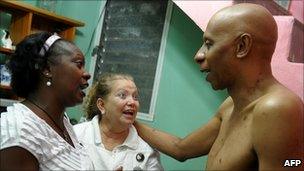Cuba dissident Farinas awarded Sakharov Prize by EU
- Published

Mr Farinas celebrated the award with members of the Ladies in White human rights group
The European Parliament has awarded its Sakharov human rights prize to Cuban dissident Guillermo Farinas.
Mr Farinas ended a hunger strike in July after the Cuban government agreed to release 52 political prisoners.
During his campaign for human rights he has staged more than 20 hunger strikes and spent more than 11 years in prison.
Mr Farinas, 48, said he accepted the award in the name of the Cuban people and all those who campaigned for greater freedom in Cuba.
Speaking to the BBC Mr Farinas said he thought the honour could make his campaign for greater freedom in Cuba more difficult.
"Anyone who is familiar with the Cuban regime understands that as a dissident becomes more well known the attacks against him become more sophisticated, more bloody and more inhuman", he said.
But he said he was not afraid to continue his campaign for peaceful change in the island.
"The only fear I have is of failing the Cuban people and the campaign for democracy in Cuba", he said.
Bargaining chip
He added that he expected the communist government to release more jailed dissidents.
"I think the Cuban government has learned that to win over the European Union, it has to make gestures that are public and visible", he said.
"For the government, political prisoners are a bargaining chip with the civilised world. We are slaves that they can sell when they want."
Cuban human rights groups say that, there are still about 100 jailed dissidents on the island.
The Cuban government denies they are political prisoners, calling them mercenaries paid by the US to undermine the revolution.
It has made no comment on the award to Mr Farinas.
Mr Farinas, a psychologist and journalist, had been near death while on hunger strike this year, doctors said.
The MEPs who nominated him for the prestigious award called him "a beacon of hope for dozens of journalists and activists who are currently in prison".
Announcing the award on Thursday, the parliament president Jerzy Buzek said Mr Farinas "was ready to sacrifice and risk his own health and life as a means of pressure to achieve change in Cuba".
Cubans have been awarded the prize twice before: dissident Oswaldo Paya in 2002 and the Ladies in White group of women whose husbands are jailed in Cuba, which won the award in 2005.
The European Union, like the US, has urged Cuba for years to free political prisoners and improve human rights.
The Sakharov Prize was named after the late Soviet dissident Andrei Sakharov and was first awarded in 1988. It includes a cash award of 50,000 euros.
The Russian human rights group Memorial won the award last year.
Spain has called on the EU to normalise relations with Cuba, but the Czech Republic and Slovakia - former communist bloc countries - are among the member states against that idea.
EU foreign ministers are due to discuss relations with Cuba next week.
- Published10 October 2010
- Published29 July 2010
- Published13 July 2010
- Published9 July 2010
- Published19 March 2012